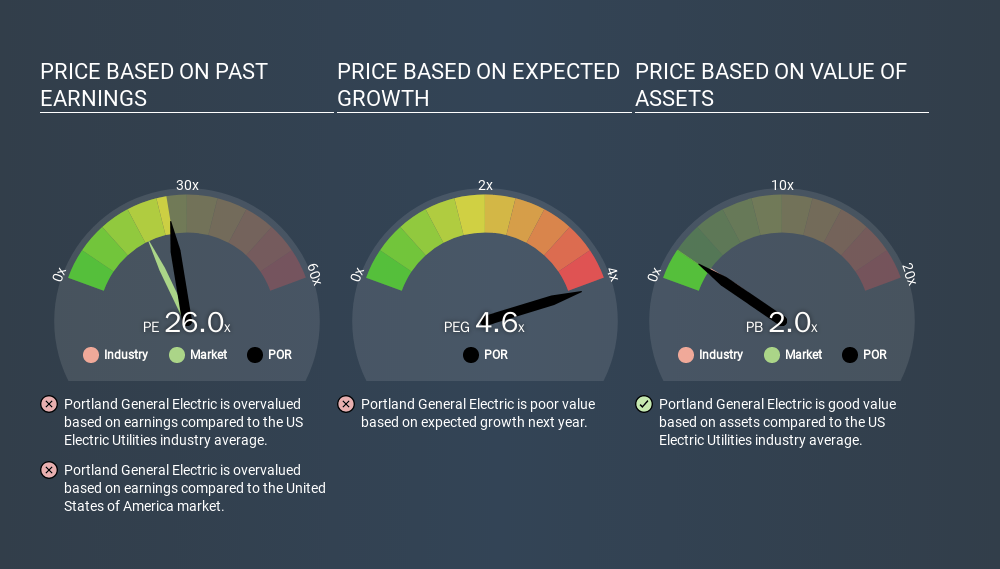- United States
- /
- Electric Utilities
- /
- NYSE:POR
Despite Its High P/E Ratio, Is Portland General Electric Company (NYSE:POR) Still Undervalued?

This article is for investors who would like to improve their understanding of price to earnings ratios (P/E ratios). To keep it practical, we'll show how Portland General Electric Company's (NYSE:POR) P/E ratio could help you assess the value on offer. What is Portland General Electric's P/E ratio? Well, based on the last twelve months it is 26.00. That is equivalent to an earnings yield of about 3.8%.
See our latest analysis for Portland General Electric
How Do You Calculate A P/E Ratio?
The formula for P/E is:
Price to Earnings Ratio = Share Price ÷ Earnings per Share (EPS)
Or for Portland General Electric:
P/E of 26.00 = USD58.81 ÷ USD2.26 (Based on the year to September 2019.)
Is A High Price-to-Earnings Ratio Good?
A higher P/E ratio means that buyers have to pay a higher price for each USD1 the company has earned over the last year. That is not a good or a bad thing per se, but a high P/E does imply buyers are optimistic about the future.
Does Portland General Electric Have A Relatively High Or Low P/E For Its Industry?
The P/E ratio essentially measures market expectations of a company. The image below shows that Portland General Electric has a P/E ratio that is roughly in line with the electric utilities industry average (25.6).

Its P/E ratio suggests that Portland General Electric shareholders think that in the future it will perform about the same as other companies in its industry classification. If the company has better than average prospects, then the market might be underestimating it. I would further inform my view by checking insider buying and selling., among other things.
How Growth Rates Impact P/E Ratios
P/E ratios primarily reflect market expectations around earnings growth rates. That's because companies that grow earnings per share quickly will rapidly increase the 'E' in the equation. And in that case, the P/E ratio itself will drop rather quickly. A lower P/E should indicate the stock is cheap relative to others -- and that may attract buyers.
Portland General Electric's earnings per share fell by 1.6% in the last twelve months. But EPS is up 3.2% over the last 3 years.
Remember: P/E Ratios Don't Consider The Balance Sheet
It's important to note that the P/E ratio considers the market capitalization, not the enterprise value. In other words, it does not consider any debt or cash that the company may have on the balance sheet. In theory, a company can lower its future P/E ratio by using cash or debt to invest in growth.
Spending on growth might be good or bad a few years later, but the point is that the P/E ratio does not account for the option (or lack thereof).
Is Debt Impacting Portland General Electric's P/E?
Net debt is 45% of Portland General Electric's market cap. You'd want to be aware of this fact, but it doesn't bother us.
The Verdict On Portland General Electric's P/E Ratio
Portland General Electric has a P/E of 26.0. That's higher than the average in its market, which is 19.0. With a bit of debt, but a lack of recent growth, it's safe to say the market is expecting improved profit performance from the company, in the next few years.
Investors have an opportunity when market expectations about a stock are wrong. People often underestimate remarkable growth -- so investors can make money when fast growth is not fully appreciated. So this free visual report on analyst forecasts could hold the key to an excellent investment decision.
But note: Portland General Electric may not be the best stock to buy. So take a peek at this free list of interesting companies with strong recent earnings growth (and a P/E ratio below 20).
If you spot an error that warrants correction, please contact the editor at editorial-team@simplywallst.com. This article by Simply Wall St is general in nature. It does not constitute a recommendation to buy or sell any stock, and does not take account of your objectives, or your financial situation. Simply Wall St has no position in the stocks mentioned.
We aim to bring you long-term focused research analysis driven by fundamental data. Note that our analysis may not factor in the latest price-sensitive company announcements or qualitative material. Thank you for reading.
About NYSE:POR
Portland General Electric
An integrated electric utility company, engages in the generation, wholesale purchase, transmission, distribution, and retail sale of electricity in the state of Oregon.
Solid track record established dividend payer.
Similar Companies
Market Insights
Community Narratives





